Kissing Books: Golden ages
Every month, Olivia Waite pulls back the covers, revealing the very best in new, and classic, romance. We're extending a hand to you. Won't you take it? And if you're still not sated, there's always the archives.
I have a hunch we’re living in a Golden Age of romance writing.
But it’s hard to tell: Golden Ages are generally the kind of thing that only get haloed in hindsight. What’s more, romance seems peculiarly resistant to an official canon of Significant Works. Very smart people have been trying to build one for decades now. And every time they try, the list proves somehow unsatisfying to nearly everyone.
Part of the trouble is that we’ll obviously need more than one canon. Are you an academic studying romance? You’re going to want to list those peaks that jut up above the broader current of history: Austen, Heyer, Woodiwiss, Garwood, Jenkins, Radclyffe, Nora—just to name a few. We’re already in an argument. Are you going with sales numbers, enduring reputation, or effect on the business of publishing as a metric? Are you parsing subgenres to follow the ebbs and flows of historical versus contemporary versus Gothic versus paranormal versus erotic? Are you doing the research to highlight forgotten milestones, with the knowledge that progress is never a straightforward unbroken narrative (you should be!)? Are you looking at the ways a genre that purports to be “by women, for women” both devalues certain kinds of women and is also controlled by publishing companies whose highest decision-making tiers are mostly if not entirely men?
So I guess we’re already having several arguments.
Perhaps you’re not an academic. Perhaps you are a new reader, looking for the best of the genre as she is currently wrote. Anyone building a canon of Best Current Romances is going to come up with a very different list of author names, and some of those Significant Books from a historical perspective turn out to be entirely skippable.
For instance, I never start new readers off by recommending Georgette Heyer. I feel like if you haven’t discovered her via dog-eared library paperback at the age of 14 or so, you’ve probably missed the ideal appreciation window and are better off with someone more modern. (And less anti-Semitic.) It’s not because Heyer is unimportant to the genre’s history! It’s just that we don’t tend to start people on horseback when they’re asking to learn to drive.
The more I think, the more I come to the conclusion that romance resists a canon because no generalized list of Important Books is ever going to eclipse the reader’s internal personal canon — the books they discovered first, the ones that moved them the most, the ones that made the world shift a little on its axis.
I’ve talked before about how romance is all about the specific: the mainstream dismisses a happy ending as “formulaic,” when in fact the whole point of an HEA is so the author can show the reader what “happy” means in this one very particular instance.
Reader’s experiences are just as unrepeatable. Each reader navigates the genre a little differently, and—here’s where the academics are really going to be mad at me—those differences matter. Those differences are everything. The order of what a person reads matters; their mood matters; the reader’s unique lived experiences affect how they respond to the text.
This timeline by definition cannot be recreated for another reader. Not identically. The specific refuses to be generalized.
A reader’s personal reading canon is closer to what we call a ludonarrative in video games: the game has a built-in story (plumber travels to castle to rescue princess) but the experience of playing the game expands, complicates, or conflicts with that story (player takes care to stop and collect coins rather than rushing right to the princess’ rescue). The built-in story gives the game structure—but the player’s experience is the point.
The Important Books canon is the game story, the reader’s canon is the ludonarrative. They can overlap, but they’ll never match completely.
Which is all a really roundabout way of saying: the problem with a canon is that it is supposed to be timeless. But the reader experience is fundamentally rooted in time: everything you read is tied to the moment at which you read it. How you react to a book depends on who you are (and when you are). No romance canon that I’ve seen includes the book Cupid’s Kiss by Karen Harbaugh—but for me, it’s one of the most important books of my life. It showed young Olivia you could put Greek gods in Regency England just for fun, just because you wanted to.
I didn’t know you were allowed to do things like that. It’s part of why I became a writer.
And that’s another reason why canons are troublesome: they’re supposed to stay fixed, but they can’t possibly. In 2015 NPR put together a list of 100 best romances; it was only five years ago and I already want to overhaul it to add a bunch of stunning new works. And remove things that haven’t aged as well (Susan Johnson’s fake Indian romance, Hot Head.) Any canon set up and left alone for too long turns into an old crone yelling at the kids to stay away from her prize dahlias. You can’t carve a romance canon in stone, because time keeps moving us all forward.
This wrestling with the press of time has been brought to you by a particularly long, cold winter, and by the experience of reading a romance told in slices of a single holiday over the course of several decades. And then another romance, set on the same holiday, by the same author—but with a totally opposite premise. Other books this month include a Black cowboy and the woman he never forgot (but who can’t remember him), a diamond heiress/jewelry designer and the long-lost love she reconnects with, a jilted-at-the-altar wedding planner forced to work with her ex-fiancé’s brother (who is annoyingly hot, damn him). It’s an exceptional crop, at the start of an exceptional year for the genre.
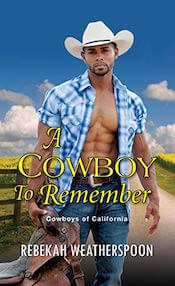
A Cowboy to Remember by Rebekah Weatherspoon (Dafina Books: contemporary m/f):
I tend to either love or hate the amnesia trope. I’m always intrigued when authors play with the importance of memory, but sometimes the tense imbalance between the characters who remember and the characters who forget twists my breath a little too tightly and suffocates my pleasure in the story.
We have none of that happening here, thankfully. Weatherspoon has gifted us a profoundly thorough take on what’s usually a hand-wavey premise: Evie has forgotten everything, not just what’s narratively convenient—she doesn’t recognize herself in the mirror, doesn’t remember in-jokes with her best friend, doesn’t remember how to cook even though the day before her fall she was an award-winning tv celebrity chef. She’s also dealing with the physical fallout of her injury: exhaustion, disorientation, live-in care, the need for new hairstyles, and the scar on her scalp. Things which normally get glossed over as Not Romantic, but which are such powerful ways to explore a character in three dimensions.
Oh yes, and her agent’s pretty sure someone tried to murder her. In case you think Weatherspoon can’t blend emotional subtlety with high-stakes external conflict.
About the only thing Evie does have left is flashes of memory of a gorgeous Black man—who turns out to be Zach Pleasant, one of three brothers who own the California ranch where Evie grew up, and the nearest thing to family she has left. Zach and Evie have A History, and weren’t on speaking terms when she had her accident—he tells her immediately that things between them are strained, and why, but to the reader it is abundantly clear that there is more to their history than Zach realizes. He’s trying to be honest, but how can he be honest with Evie when he hasn’t been honest with himself yet?
Reader, I adored this conflict.
I adored this world. There’s so much there there: so many hooks for the feelings, so much potential. You have to love it when a series starts out this strong.
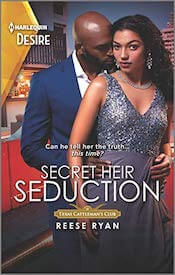
Secret Heir Seduction by Reese Ryan (Harlequin Desire: contemporary m/f):
A good category romance is like a good martini: the ingredients are minimal and easy to get together, but there’s alchemy in the mixing of them. If you’ve had a great martini—a truly great one, blended by an expert—you know there’s no substitute. And you know how very hard it is to get the balance just right.
Reese Ryan’s entry in the multi-author Texas Cattlemen’s Club: Inheritance miniseries has everything a Desire ought to: dazzling glamour, family secrets, and high-octane emotion delivered straight-up, no chaser. Everyone (we see perhaps one too many cameos from past couples in the miniseries) is gorgeous and talented and passionate, reluctant to settle for second-best, determined not to let themselves get hurt again (but doomed to fall in love regardless, of course).
But the thing I loved the most was the way work worked in this novel. Audra is a diamond heiress, sure, and she has more piercings than any Harlequin heroine I’ve seen (tongue stud, nose piercing, belly ring, oh my!)—but first and foremost she is a high-end jewelry designer, and we see on the page how much time and energy she puts into her work. This makes her a perfect match for Darius, a rising performance wear designer and fellow workaholic. They bond over that unique combination of creativity and business ambition, and it gives them a connection besides the sexual that really drives home their suitability as a couple. It’s also a beautiful anchor for the angst—and it left me with a warm, comforted feeling in my chest, just the thing I want from a category.
Darius wanted to walk out. Refuse to play along with the old man’s sick game. But a part of him needed answers. And this was the only way he’d finally get them.
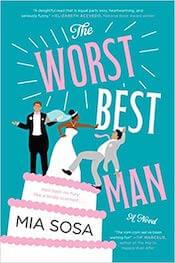
The Worst Best Man by Mia Sosa (Avon Books: contemporary m/f):
I’ve been craving another Mia Sosa book since her exuberant stuntman/gym instructor romance, and it doesn’t hurt that this book has one of the best illustrated covers I’ve seen as that trend resurges.
Max definitely lives up to his title of Worst Best Man at the start of this story: he wakes up achingly hungover, five minutes before the wedding, and with a text from the groom saying essentially You were right, the wedding’s off, tell the bride for me. Dear god. There oughta be a word for this sharp mix of joy/horror one feels watching poor Max flail his way through this first chapter. I loved him at once, fiercely.
The bride is Lina, and — oh dear god — she’s not just a bride. She’s a wedding planner. And she prides herself on her icy control of emotion — not because she doesn’t have any of them, but because she’s a woman of color and the world is primed to turn her feelings into weaknesses. So she handles her business as best she can and gets on with her life. She’s pricklier than Max, warier — and I couldn’t wait to see her learn to trust someone.
They end up working together and hiding the fact that they know one another. They end up stranded at an inn, forced to share a room. It’s a masterclass in all my favorite rom-com beats: Only One Bed, Okay Maybe Just A Fling Then, Oh No My Family Loves You/Oh No My Family Hates You. There’s embarrassment and banter, but no cringeworthy humiliation.
A lot of books are claiming the rom-com title these days — but a lot of them focus more on the rom than the com. Not so here — this book is fucking hilarious. I’ve liked Mia Sosa’s past work, but this story put her firmly on my auto-buy list. She’s pushed herself as a creator, and put so much heart and thought and wit into this. As a critic I can only say: you absolutely love to see it.
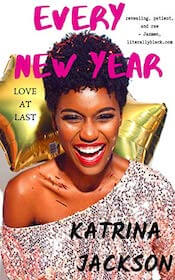
Every New Year by Katrina Jackson (self-published: contemporary m/f):
This is the moment where I confess: I read the wrong Katrina Jackson New Year’s Eve book.
I’d heard something about Katrina Jackson, and a heist, and a holiday, and I grabbed the first likely title and opened it up. And couldn’t stop—this book skewered me through in chapter one and didn’t let up until the epilogue wrung the last ugly tear from my exhausted-but-satisfied heart.
Candace Garret and Ezra Posner meet in college. Their best friends fall in love at first sight and become instantly inseparable—so Candace and Ezra are thrown together a lot. Especially at the couple’s New Year’s Eve parties. Where Candace and Ezra kiss. Then a little more, the following year. Then hookups, every year at midnight, as December 31 becomes January 1 and fireworks burst in the background.
Until it’s too much and they fall apart. Then end up meeting on a flight to South America, on yet another New Year’s Eve.
This is Katrina Jackson in her sweetest, most poignant mode. Do you like pining? The deepest, most helpless, loneliest, lustiest kind of pining? This is your book: both our characters do a lot of it. It’s gorgeously written, and heartbreakingly tender, and it flickers brilliantly backward and forward through the years like an art house film. Shuffled timeline books can be tricky, but this one was incredible—I’m going to have to reread, just for the pleasure of watching how the author manages to tell a forward-moving story almost entirely in flashback.
Candace Garret was tall, almost as tall as him, with big curly hair that framed her head and gave her a few inches more height, wide hips and the brightest smile he’d ever seen. She was also way out of his league. He knew that. She knew that. Everyone knew that. Because Candace Garret was way out of everyone’s league.
This Month’s Con Artist Heroine Who Knows What She Wants And Just Steals It Already
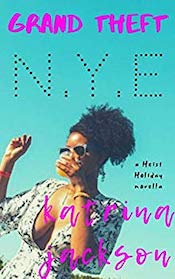
Grand Theft NYE by Katrina Jackson (self-published: contemporary m/bi f):
Indulge me with the rare column that includes two books by one author, because once I realized there were two New Year’s-themed books by Katrina Jackson I had to read both to see how they stood as a pair.
Every New Year was a heartbreaker—this novella is a panty-dropper. We’re back in the world of Pink Slip and Private Eye, where everyone’s up to no good and things couldn’t be hornier. I tend to prefer my erotica joyous and juicy rather than angsty, and this book takes great delight in being creatively filthy and funny and ready to go from the start. Con artist Cleo’s already stolen everything she needs from her mark, and is in the middle of a dramatic exit from a party full of too-rich, too-useless men—when the hot, powerful, and obviously wealthy Mr. Shimizu offers her a ride home. Cleo likes the look and sound of him, and five minutes later they are on the road doing things the highway patrol definitely does not recommend, especially in a convertible. They fuck, it’s great, she steals his car for her getaway before he wakes up.
Of course she can’t get over him. Of course there’s more to Mr. Shimizu than his money and his car. Many books have great banter, and many books have great sex scenes, but any book that can make you laugh and turn you on at the same time is to be treasured. Recommended for any and all Leverage fans, and readers who just need a solid hit of the hot stuff without any of the tortured manpain.
There are orgasms, and then there are life-changing moments between your legs. Cleo had had many of the former and a few of the latter. But this orgasm was different. It was transcendent.